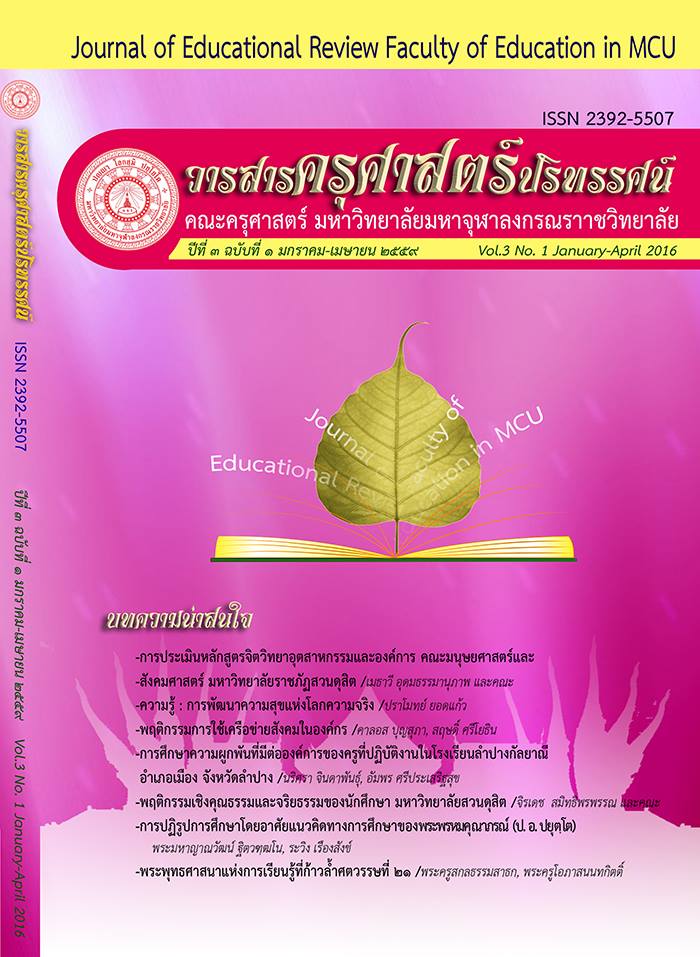Virtue and Ethic Behaviors of Suan Dusit University Students
Main Article Content
Abstract
The objectives of this research were: 1) to study virtue and ethical
behaviors of Suan Dusit University students, 2) to compare the virtue and ethical
behaviors of Suan Dusit University students based on their individual general data,
and 3) to recommend the virtue and ethical behaviors of Suan Dusit University
students. The quantitative data were collected from 1,604 students studying in the
first year and the second year and the qualitative data were collected from 43
academic, experts and students in total. The research instruments were
questionnaire, focus group discussion and in-depth-interview. The data were
analyzed by percentage, mean, standard deviation, t-test, and f-test (One Way
ANOVA).The results of the research found that:
The majority if informants were female, studying in the first year majoring
in Tourism and Services, staying in dormitories, with monthly expenditure 5,001-10,000 baht. The key role to cultivate the virtues and ethics to them was their
parents. The communication channel about the virtues and ethics that students
received was from the teachers. The model of the virtues and ethics that they
received was from the teaching activities, and they participated in activities 1-2 times
a year.
The overview of the virtue and ethical behaviors of students was regular
practice. When considering in each aspect, the most virtue and ethical behaviors of
students were on; 1) to have gratitude to parents, guardians, and teachers , 2) love
and loyalty to the nation, the religion, and the monarchy, 3) be disciplined, obey the
laws, and pay respect to elderly people , 4) be honest, dedicated, and patient, 5)
morality, integrity, considerateness, and generosity, 6) mindfulness and overcome
desires, 7) be conscious, thoughtful, and make good things, 8) understanding and
learning democratic form of government with the King as Head of State, 9) be
dedicated to the public’s and the nation’s benefits rather than one’s own benefits,
10) preservation of Thai traditions and cultures, 11) live philosophically with the selfsufficiency economy, and 12) seeking of direct and indirect knowledge and
education.
The university policy setting for the faculties and programs to use in
training and developing virtue and ethical behaviors of students should be in the
unity direction, the budgeting support for project implementation, PDCA activities,
evaluation result and adjusting activities for the achievement of students. The
development guideline can be concluded as follows:
1. The communication channel coming from the teachers having
knowledge, and virtue and ethical quality should be intervened in the classroom
activities arranged by the university, faculties or programs.
2. Building perception and understand in the virtues and ethical behaviors
of student in the same direction.
3. Public relations for the university in providing the data searching, new
technology or activities, for example the book fair week, free- cost training, student
training supporting, or online learning program.
4. Positive and negative reinforcement, such as rewarding, admiring,
praising, and punishment when breaking the rules or regulations of the university.
5. The consciousness campaign activities, voluntary mind, and charity
should be done regularly and continuously between teachers and students, students
and students in the same faculty or across faculties to build a good relation and
unity in the university.
6. The self-study project should be implemented for students before they
graduate in order to encourage them in learning, searching, tolerance, responsibility
and etiquettes in academic works.
Article Details
ทัศนะและความคิดเห็นที่ปรากฏในบทความในวารสารฉบับนี้ถือเป็นความรับผิดชอบของผู้เขียนบทความนั้นเพียงผู้เดียว และไม่ถือเป็นทัศนะและความรับผิดชอบของกองบรรณาธิการ
กองบรรณาธิการขอสงวนสิทธิ์ในการคัดเลือกบทความลงตีพิมพ์และจะแจ้งให้เจ้าของบทความทราบหลังจากผู้ประเมินบทความตรวจอ่านบทความแล้ว
ต้นฉบับที่ได้รับการตีพิมพ์ในวารสารครุศาสตร์ปริทรรศน์ คณะครุศาสตร์ มหาวิทยาลัยมหาจุฬาลงกรณราชวิทยาลัย ถือเป็นกรรมสิทธิ์ของคณะครุศาสตร์ มหาวิทยาลัยมหาจุฬาลงกรณราชวิทยาลัย ห้ามนำข้อความทั้งหมดหรือบางส่วนไปพิมพ์ซ้ำ เว้นเสียแต่ว่าจะได้รับอนุญาตจากมหาวิทยาลัยฯ เป็นลายลักษณ์อักษร


